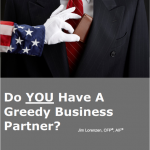
Tax-Delayed Isn’t Tax-Free
Believe it or not, investing during working years was the easy part. Just keep accumulating! Even better, the money you put aside wasn’t taxable. Such a deal! Tax-delayed doesn’t mean tax-free however.

Believe it or not, investing during working years was the easy part. Just keep accumulating! Even better, the money you put aside wasn’t taxable. Such a deal! Tax-delayed doesn’t mean tax-free however.

There are many possible tax strategies available. The question, of course, is which, if any, are appropriate for you.

Investment strategy tied to a plan can be powerful. Doing things a little differently can make a big difference.

Jim Lorenzen, CFP®, AIF® Giving to charity? While most anything can be given to charity, these are the more common forms of donated property: Cash:Cash

Jim Lorenzen, CFP®, AIF® Tax-deferred and tax-advantaged are two termsoften used interchangeably and, as a result, often lead to a lot of confusion; but, the

Jim Lorenzen, CFP®, AIF® Most people buy life insurance based on the same outdated advice they’ve been given for years. It’s predictable: buy term –

Jim Lorenzen, CFP®, AIF® If you work, you have a business partner, even if you don’t own a business. And, this partner isn’t like most

Jim Lorenzen, CFP®, AIF® For years the media and others have debated the ultimate value of an advisor to the individual investor. Some believe they

Jim Lorenzen, CFP®, AIF® Ever wonder why so many “off-the-shelf” allocation engines available today tend to look so much alike? The reason is pretty straightforward:

Jim Lorenzen, CFP®, AIF® Scott and Linda (not their real names) are in their 50s and have done a lot of things right: They’ve worked
While the Fed continues to target a 2.0% inflation rate, headwinds in the form of inflation pressures from worker shortages, tariffs, and foreign conflicts are coming at a time as America approaches a historic demographic milestone – a record number of individuals turning 65 this year.
Back in the 1990s, taxes and fiduciary standards weren’t talked about. The financial headlines were dominated by star fund managers and double-digit growth stories. Financial talk shows and glossy magazines alike obsessed over who was “beating the market.” The mantra was simple: accumulate assets. That was the measure of success.